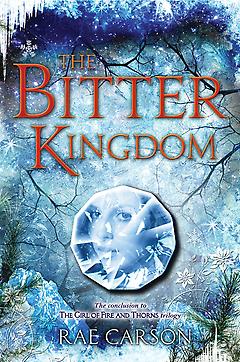The Bitter Kingdom is the final volume in Rae Carson’s debut trilogy, after 2011’s The Girl of Fire and Thorns and last year’s The Crown of Embers. These novels may be marketed at the YA audience, but adult epic fantasy aficionados will also find them worth their while: Carson knows how to tell a damn good story.
The Bitter Kingdom starts hard on the heels of the events of The Crown of Embers. Elisa, queen of Joya d’Arena and bearer of a magic “Godstone” in her navel, faces fresh challenges to her rule. Her kingdom is threatened by civil war, as the Conde Eduardo and one of her generals has risen in revolt and seized her capital. The commander of her royal guard, Hector—a man whom she loves and whom she intends to marry in order to make a political alliance with his powerful family—has been captured by the Joyans’ longtime enemies, the nation of Invierne. Elisa means 1) to ride to his rescue, 2) to compel the Invierno to accept a peace, and 3) to put down the revolt against her rule back home in Joya d’Arena.
In that order.
“We run.”
The opening line of The Bitter Kingdom sets the pace for the pages that follow. The first-person present-tense narrative lends itself well to breathless, breakneck, headlong intensity: it grabs you by the throat from the offing, and doesn’t let go.
“My companions—an assassin, a lady-in-waiting, and a failed sorcerer—are all more accustomed than I am to hard travel, and I dare not slow us down.”
Elisa and her small band of companions race across the landscape in the best traditions of heroic fantasy. Belén, Mara, and the Invierno failed sorcerer Storm, are joined first by a half-Joyan half-Invierno child called Mula, and after the daring rescue, by Hector. In Umbra de Deus, overshadowed by two volcanoes, Elisa and her company encounter Storm’s family and two members of the Invierno ruling council, the Deciregi. Magic, betrayal, conspiracies, more daring rescues and dreadful revelations combine explosively—and this is only The Bitter Kingdom’s midpoint.
It’s inevitable that the second half of the book should suffer by comparison. Materials can only be maintained under tension for so long before they undergo ill effects, and this is as true for narratives as for physical substances. There’s only so much headlong racing a body can read…
It’s to Carson’s credit, however, that the latter half of the book only suffers a little. Elisa and her brave band race the invading Invierno Deciregi to the city of Basanjuan, where she means to meet her fellow queens, her sister Alodia and her friend Cosmé, and form an alliance. (Through snowy mountains and deep mines filled with poisonous scorpions: the nod to Tolkien made this reviewer, at least, smile.)
Elisa’s triumph is completed when she regains her capital, and her crown. Along the way, she has lost her Godstone, having carried out the task divinely ordained for her to perform. That task had nothing to do with the political struggles she’s faced. As Hector says, “Your Godstone didn’t drive you to do all those things. You did them all yourself.”
The Bitter Kingdom marks the culmination of one of the more interesting takes on the “Chosen One” topos in fantasy I’ve yet read. Unlike gritty fantasy, which subverts the idea of the “Chosen One” in a wholly different way, Carson has subverted the idea of the “Chosen One” with gentle irony. Elisa is Chosen for a task that makes sense only in the “mind of God,” as the novel has it. It is her own choices which catapult her to political pre-eminence. Being queen and the saviour of her country is all on her, not on fate.
And that, combined with Carson’s lean, driven storytelling style, is why I’ll be recommending this trilogy far and wide. I may quibble with some of the narrative choices, such as the decision to include chapters from Hector’s point of view only while he and Elisa are separated, but on the whole?
On the whole, The Bitter Kingdom—and indeed the entire trilogy—is an achievement of which Carson can be rightly proud. Read it, people. It’s more than worth your time.
The Bitter Kingdom is available now from Greenwillow Books
Liz Bourke is a cranky person who reads books. Her blog. Her Twitter.











I hadn’t heard of this series before I read this review, but now–and after reading a few reviews of “The Girl of Fire and Thorns”–I may just have to drop by the library and look it up!